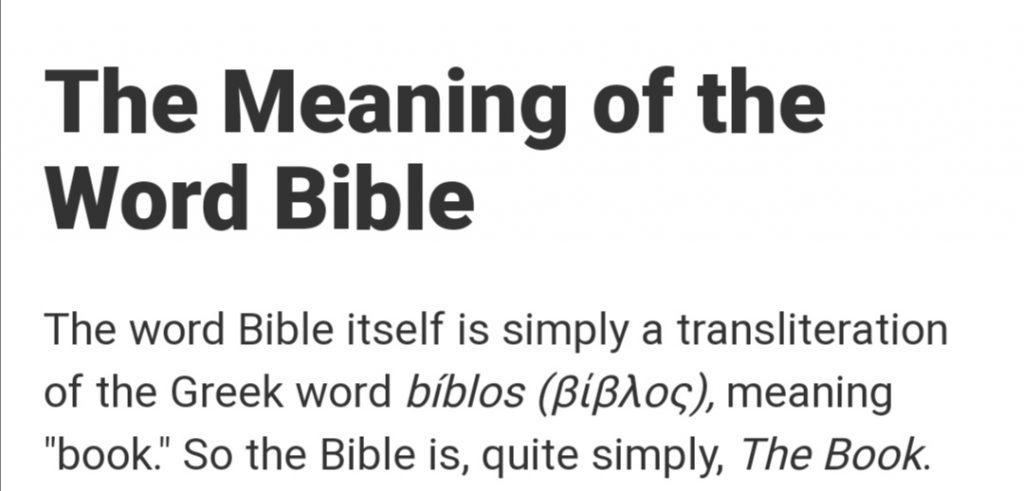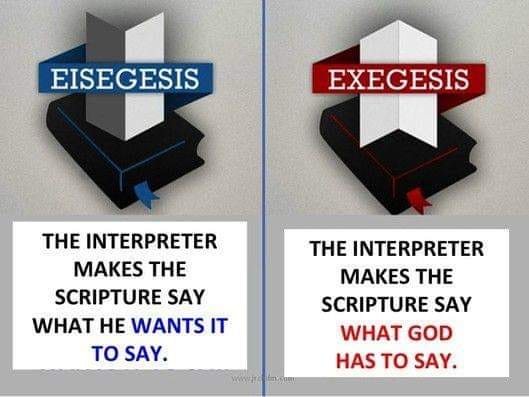
The Bible and the Quran are different. You cannot read one the same way you read the other.
The Quran is believed to be the exact speech of Allah, given to one man and written down as dictation verbatim.

The Bible is not a dictation of God’s speech. It was written by prophets and apostles over a period of 1500 years and their writings constitute a message.

Although the Bible comprises of multiple books, it is also one unified Book with a single theme running through from the beginning to the end.

For this reason, the Bible must be read in context. To take one verse and to inject your own bias, presupposition or agenda to it, is misinterpretation. This is how cults were formed. Every verse, every chapter, every book in the Bible is connected.
“Scripture interprets scripture.” This is a principle of interpretation which simply means the scriptures is in harmony and one part of Scripture can be used to interpret other parts of Scripture.
“The Bible is a collection of divinely inspired writings written by a number of authors, living in different geographical areas in some cases, and written over a long span of history, yet it retains an amazing unity. Because the many voices of Scripture make up God’s unified revelation, we want to let Scripture interpret Scripture. This involves examining what the Bible has to say on a topic as a whole rather than just picking stray verses here and there and coming to a conclusion.“
Mark Driscoll,
However, this is not necessarily the case for the Quran. There is very little context in the Quran, if any. The Quran seems more like a random haphazard collection of verses. One verse often does not necessarily relate in any way to the next verse. For someone reading the Quran for the first time, it might be jarring experience to see the utter incoherence that is clearly evident, verse after verse, chapter after chapter.
“My idea is that the Quran is a kind of cocktail of texts that were not all understood even at the time of Muhammad. Many of them may even be a hundred years older than Islam itself. The Quran claims for itself that it is ‘mubeen’, or clear. But [contrary to popular belief] if you look at it, you will notice that every fifth sentence or so simply does not make sense…the fact is that a fifth of the Quranic text is just incomprehensible. If the Quran is not comprehensible, if it can’t even be understood in Arabic, then it’s not translatable into any language. That is why Muslims are afraid. Since the Quran claims repeatedly to be clear but is not—there is an obvious and serious contradiction. Something else must be going on”.
Gerd R. Puin, German scholar, specialist in Arabic orthography and Quranic manuscripts
To find the context i.e. when, why and how verses were revealed, one has to venture outside the Quran, to the hadiths and tafseer. On the other hand, very often Biblical context is in the Bible itself. The Bible does not need any books outside of the Bible to explain it, unlike the Quran.
This is why reading the Quran is different from reading the Bible.
The Quran is recited. For many muslims, even understanding the meaning of the words is secondary to articulating it properly and correctly. We hear Muslims say the Quran is beautiful recitation but the majority of Muslims of the world do not read, speak and understand Classical Arabic, the language of the Quran. However they endeavor to recite it, and even memorize the words in a language they don’t know.
The Bible is different. It is to be read AND studied. It isn’t about merely reciting words with your mouth but this is about understanding the message with your heart. Muslims will argue that their scholars study their Quarn. Yes, the scholars. But I am talking about the rank and file Muslim. The vast majority are not expected or required to study it.
Since the Bible constitutes a message, it can be translated to any human language and still preserve the message so as to be read and understood in your own tongue. It is not so for the Quran. Since the Quran constitutes the exact words of Allah, any translation means it is no longer Allah’s words. Reciting or reading it means you’re no longer reciting Allah’s exact words. Therefore, all translations handicap the words of Allah.
When one reads the Bible, it is the message that is paramount. It is the message that needs to be understood. To understand the message, it is important to understand the context.
As illustration, if I want to understand verse 17 of a chapter of a particular book of the Bible, I cannot extricate verse 17 and interpret it on its own based on my opinions and bias! That is called eisegesis and it will lead to misinterpretation and error.
Instead, I have to read both the preceding verses (verse 16 and earlier) and the subsequent verses (verse 18 and later). This gives the immediate context supplying me with crucial details like:
WHO is speaking to WHOM?
WHAT is being said?
WHY is it said?
And even facts like WHERE, HOW, WHEN and WHAT is taking place?
This is the correct way to interpret and come to a conclusion about the meaning that the author intended in that verse 17.
It is equally important to also take into account how that verse being studied fits into the passage, and how the passage fits into the chapter and how the chapter harmonizes into, not just the particular book, but the Bible as a whole.

Exegesis is the only right way of interpreting Scripture. If you’re not doing exegesis, then you’re misinterpreting the message of the Bible.
I do not know if there are such principles in Quranic interpretation. I doubt it. Firstly, because there is hardly any context in the Quran. The Quran is mostly silent about WHY the verses were revealed and about the circumstances and purpose of the revelation.
Secondly, if there were rules in interpreting the Quran, Muslim scholars would surely be conscientious and careful about interpreting the Bible correctly. They would not accept eisegesis in the interpretation the Quran but are guilty of constantly indulging in eisegesis when interpreting the Bible. They often bring their own pre-conceived notions and pre-suppositions to explain individual verses in the Bible instead of studying the verses in the context of the text. (Some Muslims think the Bible is like the Sunnah of their prophet, a list if do’s and don’ts to be parroted.)
Since I know the principle of proper interpretation, I always try to understand the Quranic verses in their context whenever I read them. I always actually look up the sahih hadith and tafseer of a specific verse I read. How many Muslims do this?
“A text without a context is just a pretext for what we want it to mean…”
Ben Witherington III
Since the meaning of verses in the Quran is not a priority (or the meaning would have been made clear in the Quran itself), you can read and recite the Quran and not be overly concerned about what you are reciting except to make sure that you are mouthing the words as accurately as the way you believe Allah did.
For example, some surahs begin with the letters Alif, Lam, Mim. No one knows the meaning although some scholars have attempted to interpret them. The fact is Muhammad never explained it and neither did Allah. You just recite it and be done with it.
You cannot read / recite the Bible the same way you do the Quran. Not only are we to read but we are to study, ponder, think, reason , ask questions, so as to understand the message.
What does the passage mean?
Is it a parable? A prophecy? A poetry? A psalm?
Is it a historical narrative? Is it a letter?
Is it an example to follow? Is it a wrong to avoid?
What is the message that the author was conveying?
What did the message mean to his original readers in his time?
How does the message apply to us and relevant to our time in the 21st century?
“My son, if you receive my words and treasure up my commandments with you, making your ear attentive to wisdom and inclining your heart to understanding; yes, if you call out for insight and raise your voice for understanding, if you seek it like silver and search for it as for hidden treasures, then you will understand the fear of the Lord and find the knowledge of God.“
Proverbs 2:1-5
Study to shew thyself approved unto God, a workman that needeth not to be ashamed, rightly dividing the word of truth. (2 Timothy 2:15)
1 thought on “Reading The Bible, Reading The Quran”